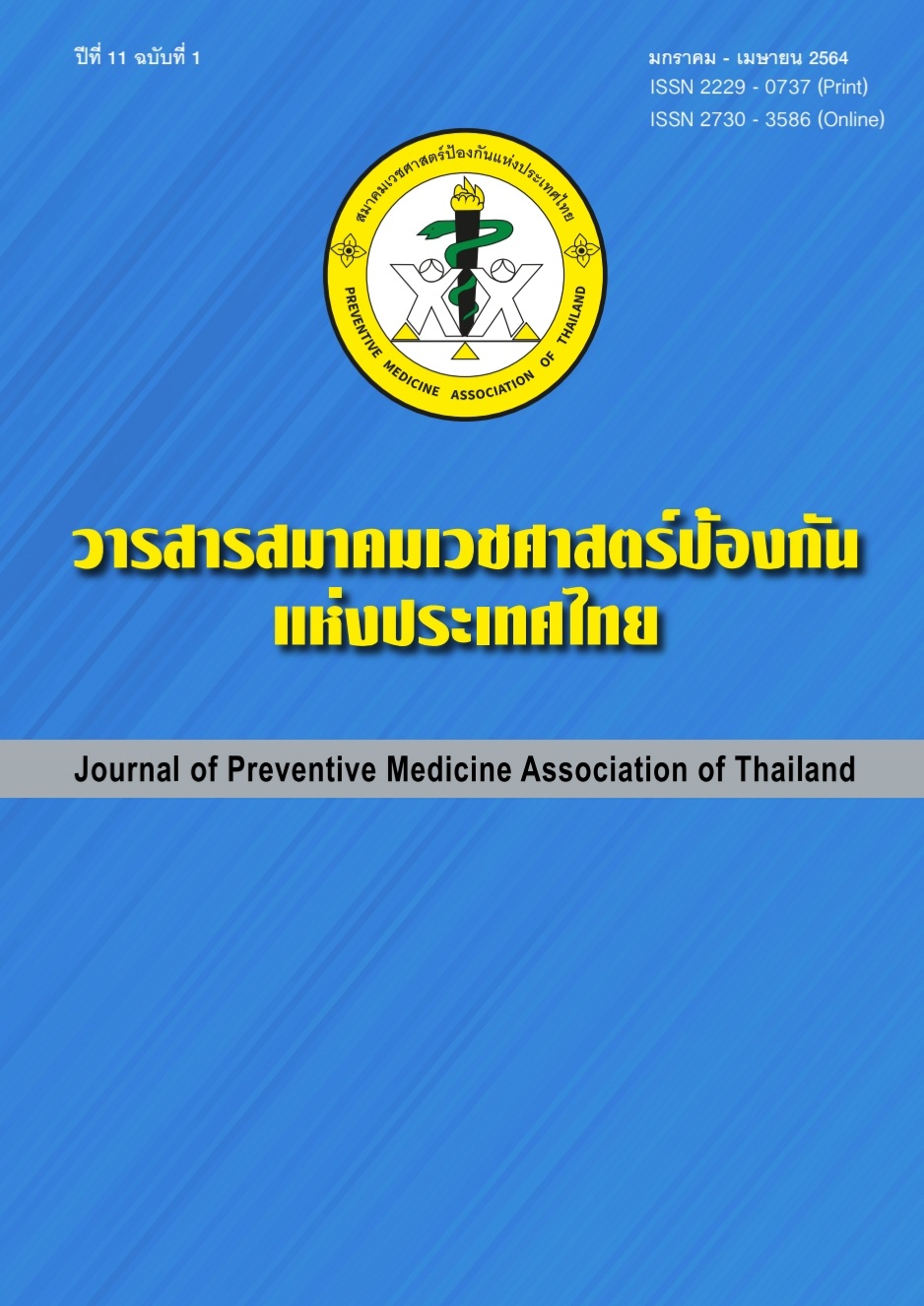The effectiveness of a development of salt diet restriction program to delay the progression of chronic kidney disease in Bangrakam District
Keywords:
Chronic kidney disease, Salt diet restriction program, Progression of chronic kidney diseaseAbstract
This quasi-experimental research (nonequivalent control group pretest-posttest design) aimed to study and compared health behavior of salt diet, knowledge of chronic kidney disease, clinical outcome including glomerular filtration rates, blood pressure, urine microalbumin and measured the salt level in food. The sample population was patients of chronic kidney disease stage 3 total of 40 participants. The experimental group participated in the salt diet restriction program in addition to usual care. The control group received only usual care. The data collection was a survey questionnaire including knowledge and behavior assessment, salinity meter PPM/TDS. The duration of the research was 25 weeks. The data were analyzed using descriptive statistics chi-square test and independent t-test. The results are the mean score of salt diet behavior and knowledge of chronic kidney disease in the experimental group after getting a salt restriction program is higher than the control group with a significant statistical level at the level 0.05. The mean score of clinical outcomes in the experimental group, including glomerular filtration rates increased, while urine microalbumin level and salt level in food decreased significantly at the level of 0.05. This research pointed out that salt diet restriction program was effective way to enhance knowledge and appropriate salt diet restriction behavior that will lead to delay the progression of chronic kidney disease in long term care.
References
สมาคมโรคไตแห่งประเทศไทยและสำนักหลักประกันสุขภาพแห่งชาติ. คู่มือการจัดการดูแลผู้ป่วยโรคไตเรื้อรังระยะเริ่มต้น. กรุงเทพฯ: สมาคมโรคไตแห่งประเทศไทย; 2555.
คำแนะนำสำหรับการดูแลผู้ป่วยโรคไตเรื้อรังก่อนการบำบัดทดแทนไต [อินเตอร์เน็ต]. 2558 [เข้าถึงเมื่อ 3 มี.ค. 2563]. เข้าถึงได้จาก http://doh.hpc.go.th/data/HL/CKD_2015.pdf
Hill NR, Fatoba ST, Oke JL, Hirst JA, O’Callaghan CA, Lasserson DS, et al. Global prevalence of chronic kidney disease – A Systematic review and meta-analysis. PLoS One 2016; 11(7): e0158765
Kerr M, Bray B, Medcalf J, O'Donoghue D, Matthews B. Estimating the financial cost of chronic kidney disease to the NHS in England. Nephrol Dial Transplant 2012;27(suppl 3):iii73-iii80.
ประเสริฐ ธนกิจจารุ. สถานการณ์ปัจจุบันของโรคไตเรื้อรังในประเทศไทย. วารสารกรมการแพทย์ 2558; 40:5-18.
Ingsathit A, Thakkinstian A, Chaiprasert A, Sangthawan P, Gojaseni P, Kiattisunthorn K, et al. Prevalence and risk factors of chronic kidney disease in the Thai adult population: Thai SEEK study. Nephrol Dial Transplant 2010;25:1567-75.
ศิริขวัญ เพ็ญสุวรรณ. ลดโซเดียม....สร้างสุขภาพที่ดีแบบยั่งยืน [อินเตอร์เน็ต]. 2561 [เข้าถึงเมื่อ 20 มี.ค.2563]. เข้าถึงได้จาก http://data.ptho.moph.go.th/ptvichakarn62/index_doc.php?docgroup=03
Faul F, Erdfelder E, Lang AG, Buchner A. G*Power 3: A flexible statistical power analysis program for the social, behavioral, and biomedical sciences. Behav Res Methods 2007; 39:175-91.
นิฤมล สบายสุข, ปิ่นหทัย ศุภเมธาพร, ณิชกานต์ ทรงไทย. ผลของโปรแกรมสนับสนุนการจัดการตนเองต่อพฤติกรรมสุขภาพและอัตราการกรองของไตในผู้ป่วยเบาหวานชนิดที่ 2 ที่มีภาวะไตเรื้อรังระยะที่ 3. วารสารวิทยาลัยพยาบาลบรมราชชนนี อุตรดิตถ์ 2561; 21:137-50.
วิชช์ เกษมทรัพย์, สุกฤตา พุ่มดวง. โครงการการทดสอบความแม่นยำของเครื่องตรวจปริมาณเกลือในตัวอย่างอาหารและปัสสาวะ เพื่อประเมินการบริโภคเกลือในคนและการประยุกต์ใช้เพื่อช่วยลดการบริโภคเกลือในประชากร [อินเตอร์เน็ต]. 2560 [เข้าถึงเมื่อ 25 มี.ค.2563]. เข้าถึงได้จาก: https://www.lowsaltthai.com/uploads/6234/files/Research/โครงการการทดสอบความแม่นยำของเครื่องตรวจปริมาณเกลือในตัวอย่างอาหาร.pdf
Cronbach LJ. Essentials of psychological testing. 4th ed. New York: Harper & Row; 1984.
เพ็ญพร ทวีบุตร, พัชราพร เกิดมงคล, ขวัญใจ อำนาจสัตย์ซื่อ. ผลของโปรแกรมการพยาบาลระบบสนับสนุนและให้ความรู้ในผู้ป่วย โรคเรื้อรังที่มีภาวะไตเรื้อรังระยะเริ่มต้น. วารสารพยาบาลสาธารณสุข 2560; 31:130-45.
Jin HH, Ho JC, Sejoong K, Dong KK, Suhnggwon K, Jung HP, et al. Effects of intensive low-salt diet education on albuminuria among non-diabetic patients with hypertension treated with olmesartan: A Single-blinded randomized, controlled trial. Clin J Am Soc Nephrol [Internet]. 2014 [cited 2020 Dec 4];9:2059–69. Available from: https://cjasn.asnjournals.org/content/9/12/2059.long
พิมพ์สุภัค ปานเพียรกุลภัค. โปรแกรมควบคุมอาหารสำหรับผู้ป่วยโรคไตเรื้อรัง ในคลินิกชะลอไตเสื่อม โรงพยาบาลพระนครศรีอยุธยา. วารสารสมาคมเวชศาสตร์ป้องกันแห่งประเทศไทย 2559;6:205-15.
He F, Li J, Macgregor GA. Effect of longer term modest salt reduction on blood pressure: Cochrane systematic review and meta-analysis of randomized trials. BMJ [Internet]. 2013 [cited 2020 Dec 4];346: f1325. Available from: https://www.bmj.com/content/346/bmj.f1325.
Downloads
Published
How to Cite
Issue
Section
License
บทความที่ลงพิมพ์ในวารสารเวชศาสตร์ป้องกันแห่งประเทศไทย ถือเป็นผลงานวิชาการ งานวิจัย วิเคราะห์ วิจารณ์ เป็นความเห็นส่วนตัวของผู้นิพนธ์ กองบรรณาธิการไม่จำเป็นต้องเห็นด้วยเสมอไปและผู้นิพนธ์จะต้องรับผิดชอบต่อบทความของตนเอง






